Coaching Corner
Apply the Equitable Learning Principles to Adult Learners and Model Them During All Coaching Interactions
Essential Coaching Action 2 is to apply principles of learning to adults and model them during all coaching interactions. It is essential for coaches to understand how adults learn using prinicples of learning (see pages 47 – 50 in NCSM Coaching in Mathematics Education book from the Essential Action series), plan time to review them and periodically revist and reflect upon them.
- Understand and employ the principles of adult learning
- Model equity and move toward vision through coaching
Reproducible from NCSM Essential Action Series: Coaching in Mathematics Education that lists the principles of adult learning and provides an example of each.
Reproducible from NCSM Essential Action Series: Framework for Leadership in Mathematics Education for coaches and teachers/teams to reflect upon productive beliefs regarding access and equity in Mathematics.
Reproducible from NCSM Essential Action Series: Framework for Leadership in Mathematics Education for coaches and teachers/teams to reflect upon current practices through a lens on social justice.
Reproducible from NCSM Essential Action Series: Framework for Leadership in Mathematics Education for coaches and teachers/teams to reflect upon current mathematics leadership actions for detracking.
A reflective tool for coaches to use while planning for professional development. Questions and a template guide the coach in planning for teacher learning and engagement.
A coaching tool to use with teachers for individual coaching to find out how teachers learn, like to get feedback, explore student learning data, and to create a goal for coaching experiences.
Hear from Zsuzsanna Diamond, Math Instructional Facilitator, K-5, Little Rock School District on how she focuses on building relationships. Moral of the story: Build relationships. Show you care. Change is hard but it is possible.
Janice Riggs, Instructional Facilitator, El Dorado Public Schools, tells her story of working with teachers to create a drastic change using Standards Based Reporting. Through positive interactions and teacher ownership, teachers' attitudes changed from panic and fear to celebration.
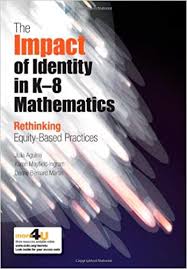 Identity is a key component of mathematics learning and teaching. This book helps teachers and leaders explore their own identity (and their students') as mathematical learners and teachers as well as discusses the effect these identities have on teaching and learning in the mathematics classroom.
Identity is a key component of mathematics learning and teaching. This book helps teachers and leaders explore their own identity (and their students') as mathematical learners and teachers as well as discusses the effect these identities have on teaching and learning in the mathematics classroom.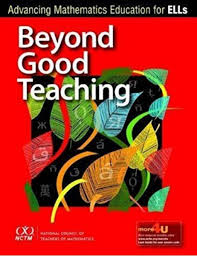 English language learners share a basic need—to engage, and be engaged, in meaningful mathematics. Through guiding principles and instructional tools, together with classroom vignettes and video clips, this book shows how to go beyond good teaching to support ELLs in learning challenging mathematics while developing language skill.
English language learners share a basic need—to engage, and be engaged, in meaningful mathematics. Through guiding principles and instructional tools, together with classroom vignettes and video clips, this book shows how to go beyond good teaching to support ELLs in learning challenging mathematics while developing language skill.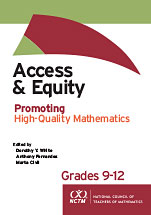 Access and Equity: Promoting High-Quality Mathematics in Grades 9–12 examines issues related to access, equity, and empowerment faced by students as they prepare for college, technical schools, or joining the workforce. Its chapters are organized across three main themes:
Access and Equity: Promoting High-Quality Mathematics in Grades 9–12 examines issues related to access, equity, and empowerment faced by students as they prepare for college, technical schools, or joining the workforce. Its chapters are organized across three main themes:• Engaging students in equity-based classroom projects
• Developing students’ positive mathematical identities
• Encouraging teachers to reflect on their own equitable beliefs and practices
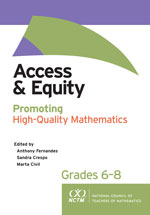 NCTM’s Access and Equity Principle states that “all students [should] have access to a high-quality mathematics curriculum, effective teaching and learning, high expectations, and the support and resources needed to maximize their learning potential.” This book offers math educators strategies and resources for putting that principle into practice.
NCTM’s Access and Equity Principle states that “all students [should] have access to a high-quality mathematics curriculum, effective teaching and learning, high expectations, and the support and resources needed to maximize their learning potential.” This book offers math educators strategies and resources for putting that principle into practice.Practice-based vignettes open each chapter, inviting readers to relate to and engage with the issues of access and equity discussed in these middle school mathematics classrooms. Questions at the end of chapters encourage readers to reflect on what they have read and then take action in adapting the suggested approaches to their own contexts.
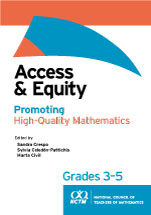 Access and Equity: Promoting High-Quality Mathematics in Grades 3–5 examines the challenges related to access, equity, and empowerment faced by students making the critical transition into mathematics of the third through fifth grades.
Access and Equity: Promoting High-Quality Mathematics in Grades 3–5 examines the challenges related to access, equity, and empowerment faced by students making the critical transition into mathematics of the third through fifth grades.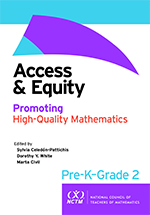 This book will help teachers in prekindergarten through grade 2 classrooms implement the Access and Equity Principle from NCTM’s Principles to Actions: Ensuring Mathematical Success for All. It looks at diversity as an asset for teaching and learning mathematics with emphasis on multilingual settings and the need for deeper mathematics among younger children.
This book will help teachers in prekindergarten through grade 2 classrooms implement the Access and Equity Principle from NCTM’s Principles to Actions: Ensuring Mathematical Success for All. It looks at diversity as an asset for teaching and learning mathematics with emphasis on multilingual settings and the need for deeper mathematics among younger children.Read a story from Liza DallaValle, Elementary Mathematics Resource Teacher, Carroll County Public Schools, MD, on how a coach led a group of teachers through a process to develop parent communication documents and the benefits for all involved.
